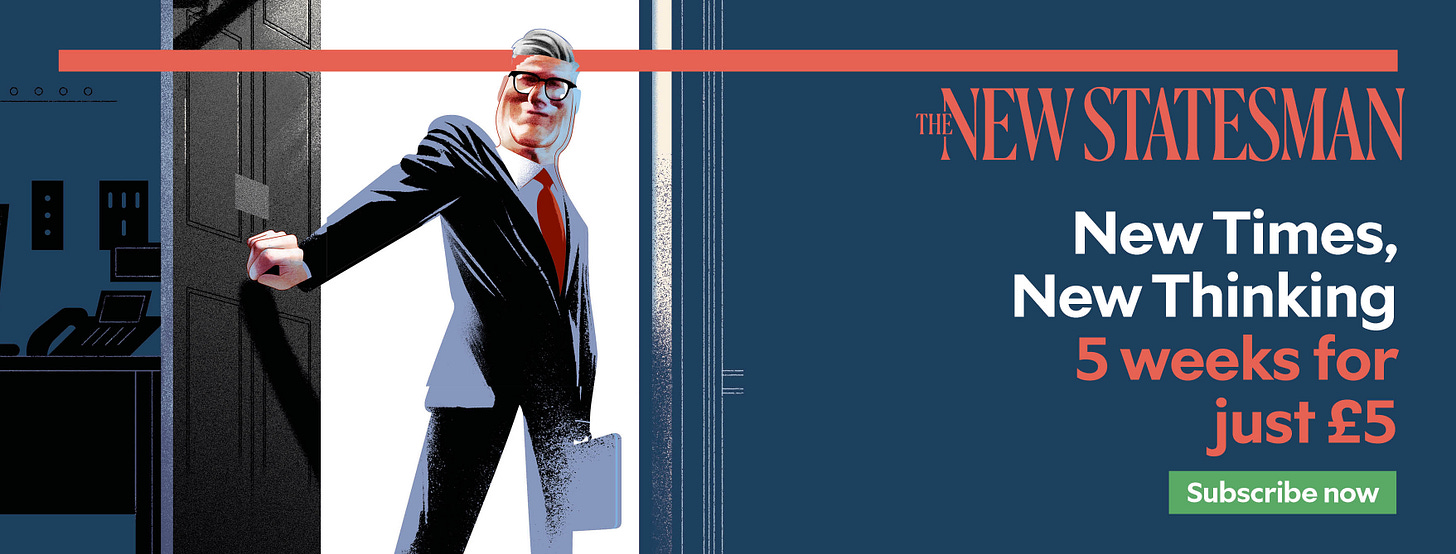Morning Call: One year of Labour rule
British politics is breaking apart. Let’s look at what the past 12 months have taught us.
Good morning, Rachel here.
One year ago today, people across the UK went to the polls and overwhelmingly voted for change. When the exit poll landed at 10pm it showed Keir Starmer’s Labour party on track for a three-figure majority – and right on cue the New Labour anthem “Things Can Only Get Better” began playing at the New Statesman election night party. The following morning, Keir Starmer stood outside the door of No 10 Downing Street (despite the common misconception, there aren’t actually any steps), and promised a new type of politics to “end the era of noisy performance, tread more lightly on your lives, and unite our country”.
Well, here we are. The media is awash today with reflections on how the last year has gone for the Prime Minister. You can read one of them, in which David Edgerton argues that Keir Starmer’s government does not represent the true Labour Party, on the New Statesman website today. You can also listen to our special anniversary episode of the New Statesman podcast with Anoosh Chakelian, Tom McTague, Andrew Marr and me, where we try to unpack quite what has happened – and where it could go next.
So instead of rehashing all of that, I thought we could zoom out and look at some of the other things the election and subsequent 12 months have taught us.
British politics is fracturing in all directions. First-past-the-post and Labour’s huge (though not unsurpassable, as we saw with the welfare cuts rebellion) majority masked an electoral landscape that more closely resembles multi-party European politics. The Electoral Reform Society (whose chief executive I interviewed in May) has calculated the parliament we ended up with was the least representative ever in terms of how people actually voted.
The 2024 result was the first time four parties had received over 10 per cent of the vote: Labour, the Conservatives, the Liberal Democrats and Reform. In the May local elections, that went up to five with the addition of the Greens. The latest YouGov poll, conducted just ahead of the election anniversary, has both Reform and the combination of the Lib Dems and Greens on 26 per cent each. That’s a Brexit-referendum majority opting for someone other than the two main parties.
Those two parties, meanwhile, are languishing around the 40 per cent combined mark: Labour on 24 per cent and the Conservatives on 17 per cent. It would take too long to list all the things they’ve both done to deserve that (please see previous Morning Call emails over the past, say, five years) but the point is they’re down together – following an election that gave them the lowest joint vote share in history at 57.4 per cent. That’s new: for 50 years the combined Tory and Labour vote would be a number in the high 70s.
This seems to have caught both parties off-guard. Last week I chaired an event at the Mile End Institute entitled “Does the Conservative Party have a future?” (a question to which no one felt too confident about). Politics lecturer Dr Nigel Fletcher, an expert in the history of oppositions, borrowed an analogy from Game of Thrones: a wheel that sees the great families cycle up and down, some rising while others fall. Dragon-wielding Daenerys Targaryen is determined not to stop the wheel, but to break it. This is, Fletcher argued, essentially what Nigel Farage and Reform are trying to do, breaking the cycle whereby the fall of Labour automatically leads to the rise of the Tories, and vice versa.
The Conservatives’ recovery from what they thought was their electoral nadir last July (until it transpired their poll ratings could actually drop further) has, in a strange way, been hampered by a misconception that Labour’s sharp fall in popularity would help them by default. It hasn’t. All it has done is fuel the narrative that both establishment parties are falling short and thrown Kemi Badenoch’s failure to begin repairing her party’s fortunes into starker relief.
Similarly, many Labour figures assumed one year ago that however difficult the political and economic situation they were inheriting, they could be reassured by the toxicity of their main opponents. Labour could afford to make some early mistakes, because the Tories would be in no position to take advantage of them.
What they didn’t count on was fringe parties muscling in to suck up disaffected supporters. In a shock move last night, left-wing MP Zarah Sultana, who has had the Labour whip suspended since last July, announced she was quitting Labour and setting up her own party with Jeremy Corbyn to challenge Starmer from the left. Corbyn himself has been suspiciously quiet about Sultana’s announcement so far – although he did spend this week hinting about some kind of new movement to bring together left-wing independents.
Even before all of that, though, data suggests nearly three times as many 2024 Labour voters are moving to the Lib Dems or the Greens than are eyeing up Reform. But the geographical distribution of the election win (think of the sandcastle analogy) means both left and right defectors pose a serious challenge. They squeeze Starmer in two directions, leaving him trapped. Rishi Sunak would sympathise.
What does this mean going into year two of this parliament? In short, things are going to get bumpy. For the first time ever, Nigel Farage is being seriously talked about as a future prime minister (including, in this week’s New Statesman magazine, by Andrew Marr). The Greens are holding a leadership over the summer and could select an eco-populist to galvanise the left, or an insurgent Corbyn-led movement could yet emerge. The Lib Dems have set their sights on eating further into what the Tories used to consider their heartlands – if it doesn’t get eaten by Reform first. Elections in Scotland and Wales in 2026 look set to become contests of who the electorate hates and fears the least.
Wednesday’s bond market wobble and subsequent Rachel Reeves love-in means it looks less likely we’ll have a new Chancellor than it did last week, but it’s pretty inevitable we’ll get a new front bench – and quite possibly a new opposition leader too, if the Tories’ “extinction-level territory” polling situation doesn’t improve. Who knows, we may even have a serious debate about electoral reform and whether first-past-the-post still works in a landscape like this.
In other words, politics isn’t going to get quieter. Sorry to disappoint.
Rachel’s picks
As mentioned above, David Edgerton does not hold back in his critique of Keir Starmer’s annus horribilis.
“We were elected on a mandate for change,” says Labour MP Andy McDonald. “After this welfare fiasco, we must return to that mission.”
Away from Labour’s rocky first year in power, Katie Stallard wonders what has happened to Iran’s missing uranium, which isn't worrying at all.
And for something a tad more cheerful this Friday morning, Henry Oliver defies the haters and insists we are living through a literary golden age.
The Government’s Industrial Strategy focuses on high-growth sectors like professional services.
At Liberty Global we’re supporting this sector through Liberty Blume – delivering tech-enabled solutions in finance, procurement, and operations to help companies scale and grow.
See how we’re helping to drive growth across the UK: https://www.libertyglobal.com/about/public-policy/powering-uk-growth/
Mailshot
Guardian: Zarah Sultana says she and Corbyn will co-lead new party
Mail: Jota and brother’s body greeted by tears and applause at Portuguese church
Patrick Maguire: Starmer and Reeves must change to survive
George Monbiot: This government is repressive
David Zahl: Against self-optimisation
Louisa Thomas: The Sincaraz era is tennis reborn









Well said
I have a very simple question: if Rachel Reeves was distressed/distraught over a private matter, what was she doing sitting on the front bench? Various lobby journalists have asked this question and pointed out that, however much the Commons looks like a bear pit, the officials working for both parties treat each other and relevant ministers with considerable respect & empathy at moments of personal crisis. So why wasn't the chancellor quietly and tactfully removed?